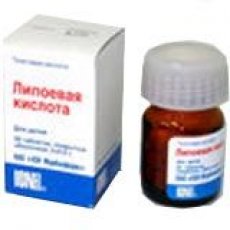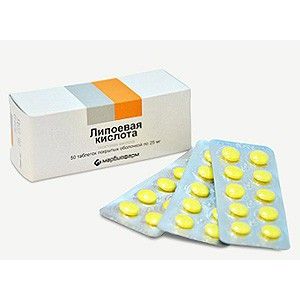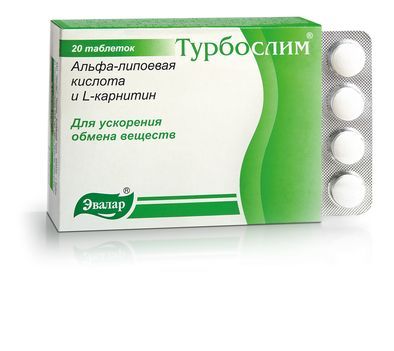Medical expert of the article
New publications
Preparations
Vitamin N-lipoic acid.
Last reviewed: 07.07.2025

All iLive content is medically reviewed or fact checked to ensure as much factual accuracy as possible.
We have strict sourcing guidelines and only link to reputable media sites, academic research institutions and, whenever possible, medically peer reviewed studies. Note that the numbers in parentheses ([1], [2], etc.) are clickable links to these studies.
If you feel that any of our content is inaccurate, out-of-date, or otherwise questionable, please select it and press Ctrl + Enter.

Vitamin N - lipoic acid - is an antioxidant found in some foods, including red meat, spinach, broccoli, potatoes, sweet potatoes, carrots, beets and yeast. It is also found in small amounts in the human body. Another common name for vitamin N is alpha-lipoic acid, thioctic acid

History of the discovery of vitamin N
In 1937, scientists discovered bacteria containing compounds later described as lipoic acid. The antioxidant activity of lipoic acid has been known and studied since 1939. In 1957, lipoic acid was found in yeast extracts. At one time, it was believed that this vitamin was a substance that the body needed but could not produce itself, but later it was discovered that the body can produce lipoic acid itself, albeit in small amounts.
Benefits of Lipoic Acid
This substance may benefit those with diabetes, heart disease, hypertension, high cholesterol, Alzheimer's disease, Parkinson's disease, and Huntington's disease. Vitamin N improves blood sugar control, treats diabetes-related neuropathy, and eliminates toxicity associated with heavy metal poisoning.
Lipoic acid plays an important role in the body's metabolism or cellular processes. Recent studies have shown that this substance is useful for treating nerve damage in diabetes. There is no reliable scientific evidence that lipoic acid prevents the development and spread of cancer. But it may have a powerful role as an adjunctive therapy to reduce the side effects of radiation therapy or chemotherapy.
Lipoic acid (vitamin N) in treatment
Lipoic acid is an antioxidant that helps protect the body from disease. An antioxidant is a compound that blocks the action of free radicals, activated oxygen molecules that can cause cell damage. Oxidation can also play a role in declining health and age-related processes. Some researchers suggest that lipoic acid may be useful in slowing down the aging process.
Lipoic acid has been used to treat diabetic polyneuropathy, a nerve disorder that affects many diabetics and causes pain and numbness in the hands and feet. Research shows that lipoic acid may also lower blood sugar levels.
Where to get lipoic acid (vitamin N)?
Lipoic acid can be obtained from food, and the body also produces it naturally, but only in small amounts. As a person ages, his body produces even less lipoic acid.
Supplements are available in capsule and tablet form and are sold in pharmacies. Many studies show that injectable forms of lipoic acid can be used. A safe and effective dose of this supplement has not been firmly established. Most studies have used doses of 300 to 600 milligrams (mg) per day. High doses of any antioxidant supplement may actually cause cell damage.
Vitamin N Research Results
There are no human studies that conclusively show that lipoic acid supplements can prevent the development or progression of cancer. However, despite a number of well-documented research reports, one can speculate on the value of lipoic acid in clinical trials.
Early studies of cells grown in the lab have shown that lipoic acid can trigger cancer cells to self-destruct, a process known as apoptosis. Much more research is needed to determine whether lipoic acid has similar effects in animals and humans.
There are encouraging results from animal and human studies that lipoic acid may reduce the harmful side effects of chemotherapy. Some chemotherapy drugs can damage nerve cells in the body, which can cause a condition called peripheral neuropathy, where patients feel pain or other sensations, usually in their arms or legs.
In an Austrian study, eight of 15 patients who received lipoic acid after taking the chemotherapy drug oxaliplatin reported improvement in symptoms. The researchers suggested that larger studies should examine this effect.
Lipoic acid against chemotherapy and other diseases
One study suggests that in rats, lipoic acid may help reduce damage to heart muscle caused by chemotherapy drugs. In 2006, the Journal reported that a combination of antioxidants, including lipoic acid, helped people diagnosed with cancer regain their appetite and body weight.
Studies have also looked at the use of lipoic acid for other medical conditions.
In a recent review, researchers reported that lipoic acid may be useful in treating nerve problems in diabetics, and that it may improve insulin sensitivity in people with type 2 diabetes.
Other studies have shown that vitamin N may be useful in liver disease. Laboratory and animal studies have also shown that lipoic acid may be useful in the treatment of stroke, cataracts, nerve damage following HIV infection, some diseases of the nervous system (such as Alzheimer's disease), and radiation injury.
The substance may also help people with high cholesterol. Human studies are currently underway to determine whether lipoic acid is helpful against these conditions.
Are there any problems or complications from vitamin N?

Most vitamin N supplements have not been tested to see if they interact with medications, foods, or other herbs and supplements. While there may be published reports of interactions and adverse effects, full studies of interactions and effects are not yet available. Because of these limitations, any information on adverse effects must be considered incomplete. What is known is that lipoic acid may interact with vitamin E and ascorbic acid, preventing them from oxidizing.
Lipoic acid in foods is a safe substance. Studies have shown that 300 to 600 mg of lipoic acid per day may be a safe dose with very few side effects, although some sources report that it may occasionally cause stomach upset or skin rashes. High doses of lipoic acid may lower blood sugar levels, something diabetics should be aware of.
Because it is a powerful antioxidant, there is concern that lipoic acid may make radiation therapy or chemotherapy less effective. For this reason, people undergoing these procedures should talk to their doctor before taking this supplement.
The effects of long-term use of lipoic acid are unknown. Women who are pregnant or breastfeeding should talk to their doctor before taking this supplement. Serious health consequences may occur if you use this type of treatment without a prescription or a doctor's recommendation.
 [ 1 ], [ 2 ], [ 3 ], [ 4 ], [ 5 ], [ 6 ], [ 7 ]
[ 1 ], [ 2 ], [ 3 ], [ 4 ], [ 5 ], [ 6 ], [ 7 ]
Vitamin N and energy
Alpha lipoic acid is an antioxidant that is produced by the body and is present in every cell, where it helps convert glucose into energy. Antioxidants work well against "free radical" attack when the body converts food into energy. Free radicals cause harmful chemical reactions that can damage cells in the body, making it harder for the body to fight infections. They can also cause damage to organs and tissues.
Other antioxidants are only soluble in water (such as vitamin C) or fat (such as vitamin E), but alpha lipoic acid is both water and fat soluble. This means it can work throughout the body to give you energy. Antioxidants are used up in the body because they attack free radicals, but evidence shows that alpha lipoic acid can help restore these other antioxidants and make them active again.
Confusion with acids
In the body's cells, alpha lipoic acid is converted to dihydrolipoic acid. Alpha lipoic acid is not the same as alpha linolenic acid, which is the famous omega-3 fatty acid that can help heart health. There is often confusion among the uninformed between alpha lipoic acid and Alpa linolenic acid, because both are sometimes abbreviated as ALA. Alpha lipoic acid is also sometimes called lipoic acid.
 [ 8 ]
[ 8 ]
Vitamin N against diabetes
Several studies have shown that alpha lipoic acid is good for helping lower blood sugar levels. Its ability to kill free radicals may help people with diabetic peripheral neuropathy, which is pain, burning, itching, tingling, and numbness in the hands and feet from nerve damage.
Alpha-lipoic acid has been used for many years to treat peripheral neuropathy in Germany. Most studies have found that it helps when used intravenously (IV) alpha-lipoic acid. Most studies of oral alpha-lipoic acid have been short-lived and poorly designed. One 2006 study suggests that taking alpha-lipoic acid to treat diabetic neuropathy may reduce symptoms compared to placebo.
Taking alpha-lipoic acid may help another diabetes-related condition called autonomic neuropathy, which affects the nerves in internal organs. One study found that 73 people with cardiac autonomic neuropathy, which affects the heart, experienced fewer symptoms of the condition after taking 800 mg of alpha-lipoic acid orally.
Diabetic Neuropathy and Vitamin N
High blood sugar levels over a long period of time can be toxic to the nerves. Diabetics who do not control their blood sugar levels eventually begin to lose sensation in their legs. Other problems arise from damage to the various nerves that supply the internal organs. Even impotence can be caused by loss of nerve sensation in the genitals.
However, high blood sugar may not be the only culprit. Diabetics are usually under high oxidative stress, and this contributes to their neurological problems.
Some studies suggest that this nutrient has beneficial effects on diabetic neuropathy due to its action as an antioxidant and by improving circulation in tiny blood vessels.
Anti-aging effects of vitamin N
Glucose (sugar) is involved in the aging process because of its ability to react with certain proteins, such as collagen, to produce glycation. That is, glucose molecules make the protein less functional, which will lead to its destruction. As we age, the level of glycosylation of proteins in our bodies tends to increase.
Glycosylation of collagen in our tendons and arteries increases with age as blood glucose levels increase, which occurs with aging. However, calorie restriction can help prevent this age-related increase in glycation. In other words, by avoiding excess sugar and excess calorie intake over many years and decades, we help our body proteins stay healthy.
Alpha lipoic acid may help reduce the rate of glycation.
 [ 13 ], [ 14 ], [ 15 ], [ 16 ], [ 17 ], [ 18 ]
[ 13 ], [ 14 ], [ 15 ], [ 16 ], [ 17 ], [ 18 ]
Practical ways of use
Eat small, frequent meals throughout the day instead of one or two overly large ones. These small meals or snacks will help keep your blood sugar levels relatively stable without wide fluctuations.
Make sure you get protein with every meal. Avoid pure carbohydrates unless you want to make yourself sleepy. Carbs can be eaten an hour or two before bed to help you feel sleepy.
Even relatively “healthy” drinks like fruit juices can raise blood sugar levels very significantly when consumed in large quantities. Many people can quickly gulp down a large amount of orange juice in the morning, in addition to a cup of coffee with a teaspoon or two of sugar – and then wonder why they gain weight.
Alzheimer's disease
Alpha lipoic acid as a new treatment option for Alzheimer's disease is good for improving neural transmission. In one study, 600 mg of vitamin N was given daily to nine patients with Alzheimer's disease (receiving standard treatment with choline esterase inhibitors) in an open-label study over a 12-month observation period. The treatment resulted in stabilization of cognitive functions in all patients in the study group.
 [ 19 ], [ 20 ], [ 21 ], [ 22 ], [ 23 ], [ 24 ]
[ 19 ], [ 20 ], [ 21 ], [ 22 ], [ 23 ], [ 24 ]
Asthma
Alpha-lipoic acid suppresses airway inflammation and hyperreactivity in an asthma model. This model was studied in mice. Doctors evaluated the therapeutic effect of using lipoic acid in the treatment of asthma. Compared with those asthmatic mice that did not take lipoic acid, mice that took it significantly reduced airway hyperreactivity, they had a reduced proportion of eosinophils and significantly improved assessments of pathological lung damage.
Blood sugar level
Vitamin N can lower blood sugar levels.
Vitamin N, Brain Function and Stroke
Because alpha-lipoic acid can easily pass into the brain, it may help protect the brain and nerve tissue. Researchers are studying lipoic acid as a potential treatment for stroke and other free radical-related brain problems, such as dementia.
Vitamin N and Glaucoma
Some preliminary studies suggest that alpha-lipoic acid may help treat glaucoma, but there isn't enough evidence to say for sure whether it works. In one study of skin aging, a cream with 5% lipoic acid helped reduce wrinkles caused by sun damage.
Food sources of vitamin N
If you're healthy, your body produces enough alpha-lipoic acid. It's also found in red meat, organ meats (like liver), and yeast, especially brewer's yeast.
Alpha lipoic acid is also available in capsule form. Your doctor may recommend an injection.
Pediatric effects of vitamin N
Alpha lipoic acid has not been studied in children and is therefore not recommended for pediatric use.
Vitamin N for adults
- You can buy it in doses of 30 - 100 mg.
- General Antioxidant Support: 20 - 50 mg per day
- Diabetes and diabetic neuropathy: 800 mg daily in divided doses
Precautions for using vitamin N
Because of possible side effects and interactions with other drugs, you should only take vitamin N under the supervision of a doctor.
Alpha-lipoic acid may lower blood sugar levels, so people with diabetes or low blood sugar should only take alpha-lipoic acid under the supervision of their doctor.
Animal studies suggest that people who don't get enough thiamine (vitamin B1) should not take alpha-lipoic acid, especially those with B1 deficiency associated with long-term alcohol abuse.
Interaction of vitamin N with other vitamins
Considered a powerful antioxidant, lipoic acid improves the effects of other antioxidants (such as vitamins C and E) and works in the body to regenerate antioxidants in the fight against free radicals. It is also used to prevent or treat liver disease, cataracts, and reduces the risk of plaque formation in the arteries.
Some proponents of this vitamin believe that lipoic acid may suppress genes that cause cancer cell growth, and some recommend it as a component of alternative cancer treatments or as an adjunct therapy to prevent or reduce some of the side effects of conventional cancer treatments.
Researchers believe lipoic acid may help prevent nerve damage after the use of certain chemotherapy drugs.
Possible interactions during treatment
If you are currently being treated with any of the following medications, you should not use alpha lipoic acid without talking to your doctor.
Medicines for the treatment of diabetes
Apha-lipoic acid may combine with these blood sugar-lowering medications, increasing the risk of hypoglycemia, or low blood sugar. Ask your doctor before taking alpha-lipoic acid, and monitor your blood sugar levels. Your doctor may recommend changing your medication dosage.
Chemotherapy drugs
Alpha lipoic acid may interfere with some chemotherapy drugs. Always ask your oncologist before taking any herbs or supplements, including alpha lipoic acid.
 [ 30 ], [ 31 ], [ 32 ], [ 33 ]
[ 30 ], [ 31 ], [ 32 ], [ 33 ]
Thyroid drugs
Apha-lipoic acid may reduce thyroid hormone levels. Your doctor should monitor your blood levels of sex hormones and periodically test your thyroid hormone levels.
Attention!
To simplify the perception of information, this instruction for use of the drug "Vitamin N-lipoic acid." translated and presented in a special form on the basis of the official instructions for medical use of the drug. Before use read the annotation that came directly to medicines.
Description provided for informational purposes and is not a guide to self-healing. The need for this drug, the purpose of the treatment regimen, methods and dose of the drug is determined solely by the attending physician. Self-medication is dangerous for your health.

